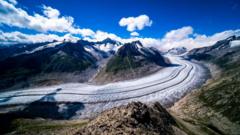The world's glaciers are experiencing an unprecedented rate of melting driven by climate change, according to a recent comprehensive scientific study. These mountain glaciers, essential for freshwater resources for millions of people, have lost over 6,500 billion tonnes of ice since the beginning of the century, averaging a 5% decline in ice mass.
As a result, the pace of melting has dramatically increased; the last decade revealed glacier losses more than a third higher than the years 2000-2011. The analysis, combining estimates from over 230 assessments by 35 research teams globally, affirms the alarming speed at which glaciers are disappearing.
Typically, glaciers remain stable in a balanced climate by gaining roughly as much snow as they lose through melting. However, rising global temperatures, primarily due to human activities such as fossil fuel burning, have led to significant shrinkage over the past two decades. In fact, between 2000 and 2023, regions outside the massive ice sheets of Greenland and Antarctica have seen an average loss of about 270 billion tonnes of ice annually.
Michael Zemp, director of the World Glacier Monitoring Service, explained this staggering figure by likening it to the water consumption of the entire global population over 30 years at a rate of 3 liters per person per day.
Notably, regions like Central Europe have experienced a dramatic 39% loss of glacier ice over just 20 years. This new study, published in the journal Nature, consolidates existing data and draws on a systematic approach to provide a clearer picture of glacier dynamics.
The estimate methods are diverse, including detailed field measurements and various satellite data analyses. By juxtaposing these approaches, researchers gain greater confidence in the findings, reinforcing the importance for climate scientists, governments, and industries concerned about the consequences of global warming.
Glaciers typically respond slowly to climatic changes, with melting expected to persist for decades. The extent of ice loss by the century's end, however, largely hinges on global warming levels driven by greenhouse gas emissions. According to the study, meeting climate targets could mean losing up to a quarter of the world’s glacier ice, while failing to do so could lead to losses nearing half.
“Every tenth of a degree of warming we can avoid will help save glaciers and reduce consequential damage,” Zemp emphasized.
The impacts of glacier melting extend beyond regional effects, as their seasonal meltwater supports hundreds of millions, acting as vital reservoirs to cushion populations against droughts. Furthermore, even minimal sea-level rises can significantly worsen coastal flooding risks, affecting millions globally. Studies indicate that since 1900, global sea levels have risen over 20cm, with predictions of faster increases in the near future, highlighting the urgent need for climate interventions to safeguard glacial resources and mitigate global risks.
As a result, the pace of melting has dramatically increased; the last decade revealed glacier losses more than a third higher than the years 2000-2011. The analysis, combining estimates from over 230 assessments by 35 research teams globally, affirms the alarming speed at which glaciers are disappearing.
Typically, glaciers remain stable in a balanced climate by gaining roughly as much snow as they lose through melting. However, rising global temperatures, primarily due to human activities such as fossil fuel burning, have led to significant shrinkage over the past two decades. In fact, between 2000 and 2023, regions outside the massive ice sheets of Greenland and Antarctica have seen an average loss of about 270 billion tonnes of ice annually.
Michael Zemp, director of the World Glacier Monitoring Service, explained this staggering figure by likening it to the water consumption of the entire global population over 30 years at a rate of 3 liters per person per day.
Notably, regions like Central Europe have experienced a dramatic 39% loss of glacier ice over just 20 years. This new study, published in the journal Nature, consolidates existing data and draws on a systematic approach to provide a clearer picture of glacier dynamics.
The estimate methods are diverse, including detailed field measurements and various satellite data analyses. By juxtaposing these approaches, researchers gain greater confidence in the findings, reinforcing the importance for climate scientists, governments, and industries concerned about the consequences of global warming.
Glaciers typically respond slowly to climatic changes, with melting expected to persist for decades. The extent of ice loss by the century's end, however, largely hinges on global warming levels driven by greenhouse gas emissions. According to the study, meeting climate targets could mean losing up to a quarter of the world’s glacier ice, while failing to do so could lead to losses nearing half.
“Every tenth of a degree of warming we can avoid will help save glaciers and reduce consequential damage,” Zemp emphasized.
The impacts of glacier melting extend beyond regional effects, as their seasonal meltwater supports hundreds of millions, acting as vital reservoirs to cushion populations against droughts. Furthermore, even minimal sea-level rises can significantly worsen coastal flooding risks, affecting millions globally. Studies indicate that since 1900, global sea levels have risen over 20cm, with predictions of faster increases in the near future, highlighting the urgent need for climate interventions to safeguard glacial resources and mitigate global risks.





















